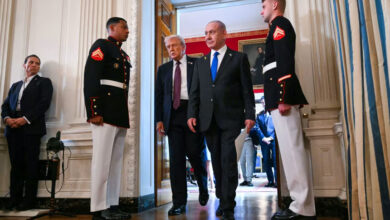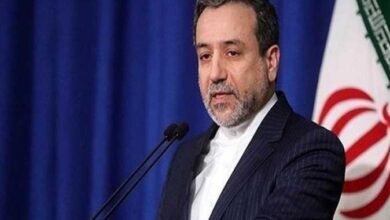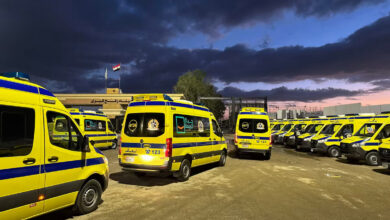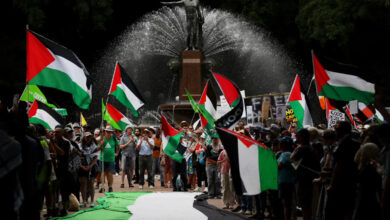Israel has become a punching bag for politicians vying for votes in Egypt's presidential race, playing on popular antipathy in Egypt toward its neighbor, but the realities of office are likely to ensure a 33-year-old peace treaty is not jeopardized.
An ex-air force commander in the race boasts of bringing down Israeli aircraft in 1973, the last of Egypt's four wars with Israel. One Islamist often refers to Israel as the "Zionist entity," rather than by name, and describes it as an "enemy."
A leftist candidate pledges to support the Palestinian resistance against Israel, where officials have watched Egypt's political turmoil with increasing wariness after the downfall of Mubarak who oversaw a cold yet stable peace.
None of the candidates want to tear up the document signed in 1979 but they repeatedly warn in rallies and debates it should be reviewed. Many of them grumble at provisions in the US-brokered deal they say are biased in Israel's favor.
Yet, beyond the bluster of the campaign trail, the next president's inbox will be full of more pressing issues such reviving an economy on the ropes.
He will also preside over a nation where the entrenched establishment of the army and security services who kept the peace secure is still intact, putting a brake on any actions that could put the deal at risk.
"Of course Israel is an enemy. It occupied land, it threatened our security. It is an entity that has 200 nuclear warheads," Islamist Abdel Moneim Abouel Fotouh said in a TV debate when asked about Israel, referring to a nuclear arsenal Israel is believed to possess but neither confirms nor denies having.
Seeking to trip up his opponent in the novel TV face-off in a nation that has never had an open leadership contest, Abouel Fotouh pressed former Arab League chief Amr Moussa on whether he too classed Israel an enemy. Moussa chose the term "adversary."
Moussa, who like Abouel Fotouh is a front-runner in the race, was Mubarak's foreign minister in the 1990s before moving to the league. In both posts he was a vocal critic of Israel.
An Israeli newspaper commentator wrote last month that Moussa had intense "disdain" for Israel.
"I intend to review the shape of relations," Moussa pledged, describing "very big disagreements." However, he said the next president would need to lead Egypt "with wisdom and not push it along with slogans towards a confrontation we may not be ready for."
‘Strong state’
Others too have reflected a more cautious line when fielding inevitable questions about Israel during campaign rallies.
Abouel Fotouh, who often refers to Israel as the "Zionist entity," said Egypt should review its treaties to ensure they were in the national interest but was not looking to start any war.
Ahmed Shafiq, who like Mubarak was a former air force commander before joining the ex-president's cabinet, told a rally when he was questioned about Israel that "a strong state is not just one with artillery and tanks but has a strong economy, strong science, strong culture."
But tough talk still features on the campaign trail.
Leftist candidate Hamdeen Sabbahi pledged in a television interview: "I will support whoever resists Israel, not because of nationalism, Arabism or morality, although this is what it is, but because these are the laws of the United Nations."
Safwat Hegazy, an independent preacher who backs the Muslim Brotherhood's candidate Mohamed Morsy, has used his campaign rallies to call for the establishment of a single Arab mega-state with Jerusalem as its capital.
Morsy criticizes Israel but says he would still respect the treaty, which brings US$1.3 billion a year of US military aid. An aide to Morsy said his candidate would not meet Israeli officials as president, though his foreign minister would.
Western diplomats say popular pressure on a newly elected president could encourage more outspoken criticism of Israel. However, they say the top army and security officials who have for years kept close ties with their Israeli counterparts to coordinate across the border were likely to keep ties steady.
"There are red lines and I think everyone is aware of them. Egypt needs its close relationship with the United States, it needs the financial assistance, the investment and the loans to survive," said Shadi Hamid, director of research at the Brookings Doha Center.
The peace deal has been a cornerstone of Egypt's foreign policy. While it may not have the prominence Mubarak gave it, the generals, who have overseen Egypt's transition, are unlikely to let that change.
The army is expected to remain influential long after the formal handover to a new president by 1 July.
Nevertheless, Hamid said Egypt's politicians could "test how far they can go … before arousing the wrath of the international community."




